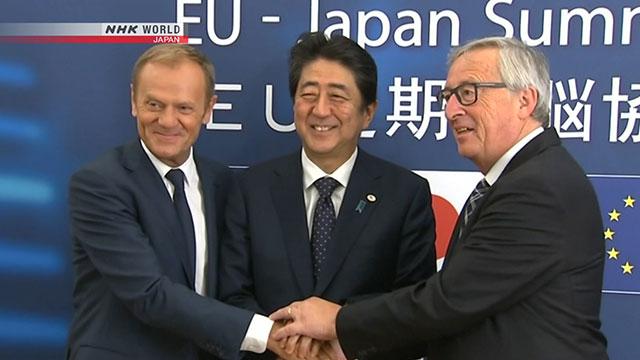The GDPs of Japan and the EU together make up about 30 percent of the global total. That means this is one of the world's biggest trade agreements. Both sides agreed to get rid of tariffs on most of the goods they trade. Japanese Prime Minister Shinzo Abe has stressed the importance of promoting free trade.
"Japan and the EU demonstrated our strong political will to raise the flag of free trade high, when there are moves toward protectionism in the world. It's a result we should be proud of and this is a powerful message to the world," said Japanese Prime Minister Shinzo Abe.
Under the deal, the EU will phase out a tariff on Japanese passenger cars over 7 years. They will do the same for sake, or rice wine, immediately.
Japan will create a quota for European soft cheeses and remove duties over 15 years. Both sides will abolish tariffs on wine from the start.
Both Japan and the EU will need the approval of their parliaments to put the trade deal into effect. Sources say it will probably take around 2 years for that to happen.
NHK World's Ramin Mellegard spoke with NHK World's economics correspondent Akiko Tokunaga about the agreement. She first explained how the two sides managed to strike a deal now after years of tough negotiations.
Tokunaga: One major reason is that Japan and the EU together wanted to send a clear and powerful signal against protectionism, just ahead of the G20 summit.
Officials started negotiations in 2013m but hit a deadlock. They could not bridge their differences over farm products and automobiles.
But the talks accelerated after US President Donald Trump took office. Japan became more eager to seal a pact after Trump pulled the US out of the Trans-Pacific Partnership free-trade deal.
Prime Minister Abe also had a political stake in clinching an early agreement. His cabinet approval rate has been dropping. He wanted to show the public that his diplomatic and economic policies are bearing fruit.
For the EU, the deal would be one way of showing off the benefits of the bloc, with Brexit casting a shadow over its unity.
Mellegard:Prime Minister Abe has said the EPA is an important part of his growth strategy. What are the merits and the challenges for Japan, going forward?
Tokunaga: One group cheering the agreement is the auto industry. The deal will level the playing field with South Korean cars. Japanese autos are at a disadvantage in the European market, as the EU already has an FTA with South Korea.
Japan's sake and green-tea producers are also hoping for an increase in exports.
What's more, the agreement with the EU can help leverage negotiations in Japan's other trade deals. An expert has told me that government officials would likely use the EU deal to advance talks on the TPP. They will try to persuade countries that are reluctant to go ahead with the TPP without the US, and in the end, get the Americans back on board.
The EPA could help Japan in this quest as Washington would be pressured from some powerful lobbies such as pork producers seeking more access to the Japanese market.
For that scenario to move forward, Japan would need to put the EPA into effect as soon as possible.
A broad deal on an Economic Partnership Agreement between Japan and the EU has given new hope to one group of Japanese farmers. The deal means that the EU may ease restrictions on food imports from Fukushima Prefecture. The bloc has required stringent safety checks on food from the region since the 2011 nuclear disaster.
European Commission President Jean-Claude Juncker referred to the restrictions on rice and other food imports from Fukushima.
"I would like to congratulate Prime Minister Abe on the remarkable progress Japan has made on making products from the Fukushima region safe, following the 2011 accident," he said.
Juncker also said he is confident and will work for the EU to further lift the import measures.
